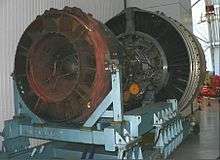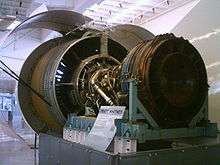Pratt & Whitney PW4000
| PW4000 | |
|---|---|
 | |
| A PW4074 powering a Boeing 777 of All Nippon Airways | |
| Type | Turbofan |
| Manufacturer | Pratt & Whitney |
| First run | April 1984 |
| Major applications | Airbus A300 Airbus A310 Airbus A330 Boeing 747-400 Boeing 767 Boeing 777 Boeing KC-46 McDonnell Douglas MD-11 |
| Developed from | Pratt & Whitney JT9D |
| Developed into | Engine Alliance GP7000 |
The Pratt & Whitney PW4000 is a family of high-bypass turbofan aircraft engines with certified thrust ranging from 52,000 to 99,040 lbf (230 to 441 kN). Built as the successor to the JT9D series engines, it has found much wider application than its predecessor.
Design and development
The PW4000 is divided into three distinct families based on fan diameter.
The first family is the 94 inch (2.4 m) diameter fan with certified thrust ranging from 52,000 to 62,000 lbf (230 to 275 kN). It powers the Airbus A310-300, A300-600 aircraft, Boeing 747-400, 767-200/300 and McDonnell Douglas MD-11 aircraft and is certified for 180-minute ETOPS if used in twinjets. These models include the PW4052, PW4056, PW4060, PW4062, PW4062A, PW4152, PW4156A, PW4156, PW4158, PW4460, and PW4462.

The second family is the 100 inch (2.5 m) diameter fan engine developed specifically for Airbus Industrie's A330 twinjet. It has certified thrust from 64,500 to 68,600 lbf (287 to 305 kN). Models are numbered PW4164, PW4168, and PW4168A. The launch of the Advantage70 program was announced at the 2006 Farnborough Airshow with a sale to Kingfisher Airlines. This package will increase certified thrust to 70,000 lbf (311 kN,) reduce fuel burn by about 1%, and reduce maintenance costs by around 15%.
The third family is the 112 inch (2.8 m) diameter fan engine developed specifically for Boeing's 777 where it was the launch engine. It has certified thrust from 86,760 to 99,040 lbf (386 to 441 kN). Model numbers are PW4074, PW4077, PW4077D, PW4084, PW4084D, PW4090, and PW4098. It entered service on June 7, 1995 with United Airlines, and was the first jet engine to enter service with 180-minute ETOPS certification. It is an engine option for the 777-200, -200ER, and -300.
The PW4000 features advanced technology materials and Full Authority Digital Engine Control (FADEC), for enhanced fuel economy and reliability.
The engine feature the Technology for Advanced Low NOx (TALON) combustor.[1]
Variants
PW4000-94
Thrust range: 231–276 kN (52,000 lbs – 62,000 lbs)[2]
- PW4052
- PW4056
- PW4060
- PW4062
- PW4062A
- PW4152
- PW4156A
- PW4156
- PW4158
- PW4460
- PW4462
PW4000-100
Thrust range: 287–311 kN (64,500 lbs – 70,000 lbs)[3]
- PW4164
- PW4168
- PW4168A
- PW4170
PW4000-112

Thrust range: 329–436 kN (74,000 lbs – 98,000 lbs)[4]
- PW4074/74D
- PW4077/77D
- PW4084/84D
- PW4090/90-3/90D
- PW4098
Applications
- Airbus A300-600
- Airbus A310-300
- Airbus A330
- Boeing 747-400
- Boeing 767-200ER/-300(ER)/-400ER/Boeing KC-46
- Boeing 777-200(ER)/-300
- McDonnell Douglas MD-11
Specifications (PW4084)
General characteristics
- Type: Two spool high bypass ratio Turbofan
- Length: 163.1 in (13.59 ft; 4.14 m)
- Diameter: 112 in (9.3 ft; 2.8 m) (fan)
- Dry weight:
Components
- Compressor: 1 stage fan, 5 stage low pressure compressor, 15 stage (5 variable) high pressure compressor
- Combustors: Annular
- Turbine: 2 stage high pressure turbine, 5 stage low pressure turbine
Performance
- Maximum thrust: 74,000–98,000 lbf (329–436 kN)
- Overall pressure ratio: 32.0:1 – 35.4:1
- Bypass ratio: 5.3:1
- Turbine inlet temperature: 707
- Thrust-to-weight ratio: 6–7
See also
- Related development
- Comparable engines
- Related lists
References
- ↑ Jeff Schweitzer, Pratt & Whitney (14–17 July 2003). "Propulsion Technology Readiness for Next Generation Transport Systems". AIAA International Air and Space Symposium and Exposition. doi:10.2514/6.2003-2787.
- ↑ Pratt & Whitney. "PW4000-94". Retrieved 4 January 2010.
- ↑ Pratt & Whitney. "PW4000-100". Retrieved 10 April 2016.
- ↑ Pratt & Whitney. "PW4000-112". Retrieved 4 January 2010.
- ↑ The PW4000 1000". International Aviation Services Group Engine Report. Accessed 2 Nov 2009
- ↑ PW4000-100. P&W Website. Accessed 2 Nov 2009.
- Gunston, Bill (2006). World Encyclopedia of Aero Engines, 5th Edition. Phoenix Mill, Gloucestershire, England, UK: Sutton Publishing Limited. ISBN 0-7509-4479-X.
External links
| Wikimedia Commons has media related to Pratt & Whitney PW4000. |
- Pratt & Whitney PW4000-94" Product Page
- Pratt & Whitney PW4000-100" Product Page
- Pratt & Whitney PW4000-112" Product Page